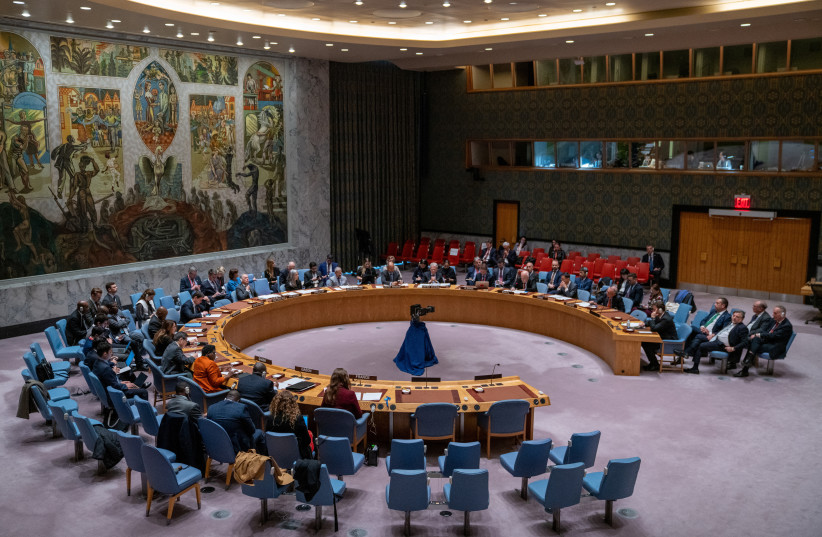The United Nations Security Council plans to hold a closed-door meeting Friday on the two-day IDF military raid on the West Bank city of Jenin to destroy Palestinian terror infrastructure that ended early Wednesday morning.
The United Kingdom, which holds the rotating presidency of the Security Council for July, convened the session at the request of the United Arab Emirates, France, China, and Brazil.
The Security Council last held a closed-door session on the Israeli-Palestinian conflict less than two weeks ago when the 15-member body gathered to discuss accelerated West Bank settlement activity.
Palestinian Authority demands
Palestinian Authority envoy Riyadh Mansour wrote this week to British Ambassador Barbara Woodward asking for a Security Council meeting and demanding action to “hold Israel accountable for its crimes” in Jenin and elsewhere in the Palestinian territories.
He asked that the UNSC take steps such as imposing an “arms embargo” against Israel and the “withholding of any assistance that can be exploited to sustain its colonization schemes, with a view to ending this illegal, deplorable situation.”

Mansour also called on the UNSC to ensure international protection for the Palestinian people, whom he said, are “entitled to defend themselves” against Israeli aggression.
“They must not be left to the mercy of Israel and its military forces and settler militias who have taken the paralysis of the international community as a green light to carry on with their crimes and terror against them,” he said.
On Wednesday morning, the UN published initial data on the harm caused to Jenin as a result of the military raid, including the displacement of 3,500 Palestinians. At least 12 Palestinians, including five minors, were killed and 143 people were injured, it added.
The army – which lost a soldier in the clashes – said it killed combatants only.
Security forces also detained around 150 suspected terrorists and destroyed caches of guns and roadside mines – including an arsenal under a mosque – and a command center, the army said.
Already on Tuesday, British Prime Minister Rishi Sunak called on Israel “to adhere to the principles of necessity and proportionality when defending their legitimate security interests” including in Jenin.
He clarified that the UK was also “opposed to any settlement expansion and we have asked the Israeli government to halt and reverse its policies.”
UN High Commissioner for Human Rights Volker Turk took issue in particular with Israel’s use of armed drones during the campaign, which the IDF called Operation Home and Garden.
“Israeli forces operations in the occupied West Bank need to abide by international human rights standards on the use of force,” Volker said on Tuesday.
Israel was still bound by international law in such a context, even if the goal was to eliminate terrorism, he stated.
Those human rights “standards do not change simply because the goal of the operation is stated as ‘counterterrorism,’” he explained.
The scale of the Jenin operation, “including the use of repeated airstrikes, along with the destruction of property, raises a host of serious issues with respect to international human rights norms and standards, including protecting and respecting the right to life,” Volker stated.
“Some of the methods and weapons used... are more generally associated with the conduct of hostilities in armed conflict, rather than law enforcement,” he stated.
Specifically, he explained, “The use of airstrikes is inconsistent with rules applicable to the conduct of law enforcement operations. In a context of occupation, the deaths resulting from such airstrikes may also amount to willful killings.”
Reuters contributed to this report.
